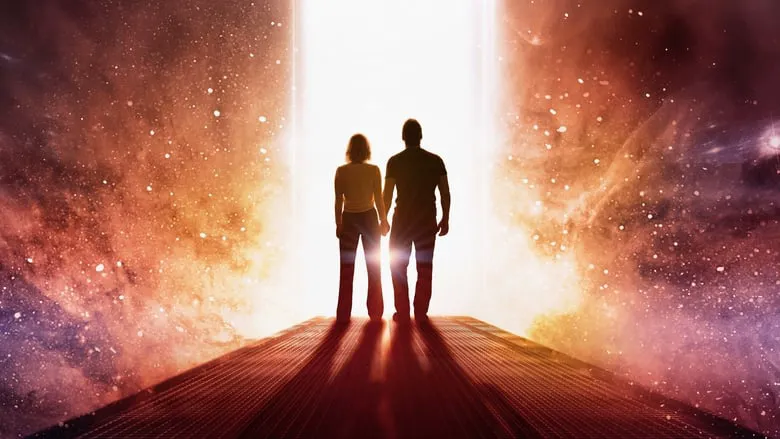Passengers: A Muddled Mix of Sci-Fi Drama and Action
A less than stellar attempt to blend a fantastical drama with a sci-fi action flick.
The spaceship “Avalon” is on a 120-year journey to colonize a distant planet. The crew and colonists are in deep hibernation, scheduled to awaken just months before arrival. However, 30 years into the voyage, the “Avalon” encounters a massive meteor storm. The defense systems fail, a malfunction occurs in the ship’s computer, and the hibernation pod of mechanic Jim (Chris Pratt) is activated. He finds himself the only person awake on the entire ship, unable to return to hibernation as the “Avalon” lacks the necessary equipment. A year passes before writer-journalist Aurora (Jennifer Lawrence) is prematurely awakened, ending Jim’s descent into madness from loneliness.

The film’s protagonist’s name, Aurora, is a nod to Princess Aurora from Disney’s “Sleeping Beauty.”
Director Morten Tyldum, known for “The Imitation Game,” aimed to create a sweeping sci-fi film where human stories took precedence over futuristic visuals. He envisioned “Passengers” as a love story born from extraordinary circumstances. Yet, it’s also a $120 million blockbuster starring two of Hollywood’s biggest names. This duality ultimately hinders the film, with its two halves working against each other.

Chris Pratt earned $12 million for his role, while Jennifer Lawrence received $20 million, plus a percentage of the profits if the film proves successful.
The Road Not Taken: A Missed Opportunity for Psychological Depth
Imagine the film as a purely dramatic love story set in space. A man wakes up, then a woman. They form a connection, leading to a passionate conflict. This could have evolved into a prolonged psychological and physical cat-and-mouse game, culminating in either a hopeful or tragic ending. Such a plot would have allowed for a deep exploration of the characters’ souls, peeling back layers of their personalities and meticulously charting the evolution of their relationship. However, that wasn’t the kind of movie studios spend hundreds of millions of dollars on.
The Road Not Taken: A Missed Opportunity for Action
Conversely, if “Passengers” had been a straightforward blockbuster, the characters would have quickly transformed into a combat team, fighting off aliens or engaging in similarly spectacular action sequences. While lacking psychological depth, it would have satisfied fans of high-octane space adventures.

A Compromised Vision
Instead, Tyldum attempted to merge both approaches. The film begins as a psychological drama, but when conflict arises between the characters, it doesn’t follow through to a logical conclusion. Instead, it introduces a shared heroic quest for Jim and Aurora, forcing them to act as a unified team and reconcile without much deliberation. This quest, however, begins late in the film and takes time to build momentum, resulting in a shortage of action. The psychological depth fades just as the audience anticipates a real conflict. It’s a case of pleasing neither side.

Competent but Unremarkable
Instead of two potentially successful films, Tyldum delivers a competent but mediocre spectacle. The design of the massive spaceship is also underwhelming. While the “Avalon” looks beautiful, impressive, and futuristic, it lacks any truly unique features beyond a swimming pool with a view of the stars. This is logical, as the ship is only meant to serve awake passengers for a few months, providing only the essentials for life and comfort. However, when the entire story unfolds on a single vessel, one hopes for something unique, something not seen on the starships of “Star Trek.”

Performances: Pratt Shines, Lawrence Falters
As expected, Pratt is perfectly cast as a decent but flawed man who isn’t afraid to be goofy and is skilled with mechanics. Before Lawrence’s character appears, Pratt effortlessly carries the film, showcasing his star charisma. Lawrence, on the other hand, is unconvincing as a New York intellectual. However, her ability to portray heroism in the finale is more crucial to the film. Until she’s required to flex her muscles and perform heroic feats, one can’t help but think, “I don’t buy it! Natalie Portman would have been a better fit.”
Unfortunately, even slight attempts at refinement don’t suit Lawrence. She looks good in elegant dresses and especially in a revealing swimsuit. The film repeatedly and deliberately shows Aurora swimming, allowing viewers to admire Lawrence in detail. These scenes are more erotic than the advertised love scene between the main characters, as the romantic “spark” between Jim and Aurora isn’t as strong as one might hope.
Finally, the film contains some funny jokes and raises a couple of interesting issues worth pondering. It’s a shame that “Passengers” raises these issues but doesn’t explore them as thoroughly as it should. Still, it’s a positive that the film occasionally stimulates the brain rather than just lulling it to sleep, as is common in modern Hollywood.